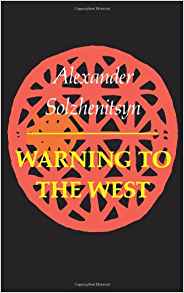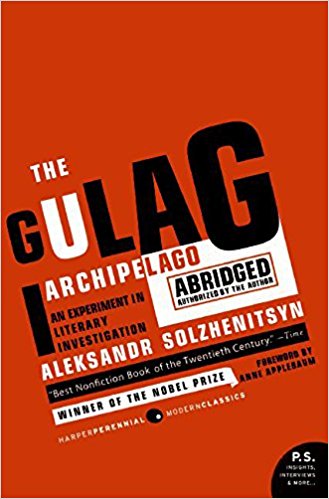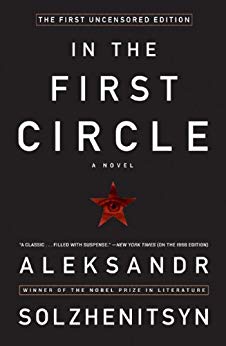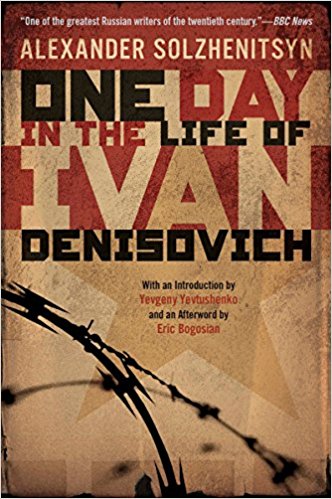Most Recent News


Popular News




Interested in learning about the life of Aleksandr Solzhenitsyn? Click here to learn about his life and his fight against Soviet communists.
 Aleksandr Solzhenitsyn (Dec 1918–Aug 2008) was a brilliant Russian novelist, historian, and survivor of communist gulags.
Aleksandr Solzhenitsyn (Dec 1918–Aug 2008) was a brilliant Russian novelist, historian, and survivor of communist gulags.
Most notably he was a major critic of communism and raised awareness about life inside the communist walls in Soviet Russia’s camp system.
His life story is really interesting, so I figured an article of it is in order. Between his dealings with the Red Army all the way through living in a gulag and criticizing the West, there was rarely a dull moment.
So how’d this story start?
Solzhenitsyn was born in Stavropol Krai, Russia. He was raised without a father as his father died in a hunting accident prior to him being born. So he was raised by a widowed mother and some other family members in a relatively humble upbringing.
When Aleksandr came of age, he studied math at Rostov State. All throughout this time, he never questioned Soviet power or authority. It wasn’t until his later years in the Red Army and when he went to the gulags that he began to question the legitimacy of the system with total control over him.
Prior to being sent to a concentration camp, Solzhenitsyn spent time in the infamous Red Army. He served as the commander of a sound-ranging battery and was involved in action at the front. During his tenure, he received two different medals (one of them being the Order of the Red Star).
While serving in East Prussia (off the front), Solzhenitsyn was arrested by counter-intelligence agencies within the Red Army after an extensive “surveillance” period.
The reason for the arrest?
He wrote derogatory comments about Stalin in private letters to a friend.
Funny how that works, merely speaking out against the communists land you in jail. Yet, most of the communists here in the States complain incessantly about Trump and do not see the irony.
Aleksandr’s arrest was placed under Article 58 paragraph 10 of the Soviet criminal code. And he even got charged with “founding a hostile organization”. You know, because sending letters is practically the same as forming a secret underground crime syndicate.
He was taken to Lubyanka prison in Moscow and violently interrogated.
Then, shipped off to the gulags.
My text would not be able to accurately justify his time spent in the gulag, which ranges over 1000 pages of text in all of his novels combined.
But a quick summary: it was as terrible as you could imagine.
Pick up a copy of A Day in the Life or Gulag Archipelago for the story in-depth. I have them attached below.
After Khrushchev gave his secret speech in 1956, Solzhenitsyn was freed and exonerated.
In 1960 (at 42 years old), he gave a script for One Day in the Life to an editor of a famous magazine in Russia. It was published in edited form, and was the only political book of his to be published in Russia successfully until 1990.
He did, however, attempt to publish Cancer Ward legally. As you can probably guess, it was denied publication until it was “cleaned of anti-Soviet insinuations”.
Naturally, he did not agree. And did not “clean” it. Rather, it was published in the West at a later time.
Likewise, The Gulag Archipelago was also denied publication in the Soviet Union. But that didn’t stop the Soviets from whining about it incessantly.
The Pravda released a report on it saying Aleksandr was supporting “Hilterites” and had “pathological hatred for the country where he was born, and for the Soviet people”.
During this period, he was constantly hounding by the Soviets and had to hide out with a friend, Mstislav Rostropovich.
In 1971, the KGB (allegedly) made an attempt to murder Aleksandr Solzhenitsyn in his home using a biological agent (ricin) through gel-based delivery method.
The attempt was near successful. It made him intensely ill, but failed to kill him.
In determining other methods to “deal with” Aleksandr, they finalized on deporting him. They deported him directly to West Germany. During this forced relocation, the KGB found the manuscript for the first book of the Gulag Archipelago.
This revelation started a massive dirt campaign against Solzhenitsyn in the Soviet Union, in preparation for its eventual release.
Aleksandr spent almost two decades in the United States following his deportation to West Germany.
For his time in the US, he heavily avoided the media, not wanting to lower his beliefs to suit television. He spent decades warning the west about communism, degeneracy, and the weakening of the moral fiber of the West.
Kind of the same things that only have gotten worse here in the States, sadly.
Even with Solzhenitsyn living in the states, the KGB still did not give up. They still feed rumors that everyone surrounding him was a KGB agent and trying to murder him. They also sent him envelopes with photographs of death, car accidents, and other abstract imagery to fill him with fear.
This caused him to stop speaking to many people and fortify his property in Vermont.
Eventually, the KGB had determined that he “isolated himself because of his reactionary views (about US’s declining moral fiber) and no further active measures would be required against him”.
 Aleksandr criticized the West for many reasons, most notably:
Aleksandr criticized the West for many reasons, most notably:
Many of these criticisms are fairly valid, looking back. The US was declining culturally, and still is in many ways. Likewise, material vulgarism was just starting in Solzhenitsyn’s time. Now it’s in full swing.
As for the media, it seems that hasn’t changed either. They are still full of sh*t.
In 1990, his Soviet citizenship was restored. However, he waited until a bit after the collapse of the Soviet Union to return (in 1994). He went back with his wife, since he was still a strong believer in Russian culture and hope for his country.
He lived the rest of his days as a free writer in Russia and eventually died of heart failure in 2008 at the age of 89.
World leaders—both Russian and from the West—paid him tribute following his passing.
So you read his life, if you’re interested in learning more than the best method is reading his works.
I am partially biased toward The Gulag Archipelago and One Day in the Life myself, but that is because I read them first. But they are all great books.
If you give them a read, make sure to come back and leave me a comment. Would love to hear your thoughts on these books. I always love reading literature from people that had lived through so much.
Anyway, check them out here:

(Read my review of this book by clicking here: The Gulag Archipelago by Aleksandr Solzhenitsyn: Book Review)




Comments are closed.
(Learn More About The Dominion Newsletter Here)
Great post! Solzhenitsyn was quite the man. I’ve read Ivan Denisovich and have both volume of Gulag Archipelago on my stack of books to read next.
And his criticisms of the United States were spot on. Seems Solzhenitsyn died at the right time, although we could sure use his voice now.
That is without a doubt. Not sure many would listen, though.
You’ll have to get back with me after you read Gulag, would love to hear your thoughts on it. Easily one of the best books that “opened my eyes”, so to speak. Originally read it when I was really young, revisited it not too long ago and knew I had to write up a post about it.
Will do. I’m already aware of the horror that was the USSR from an intellectual perspective. But reading accounts of people who were there and suffered brings it all home at a visceral level. I simultaneously can’t wait to read the books and am almost too horrified to dig in to them.